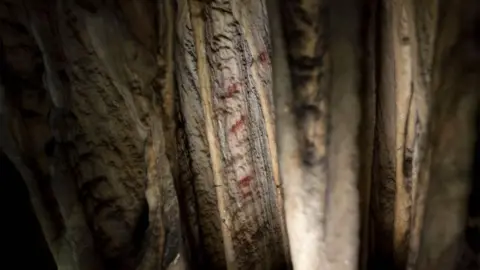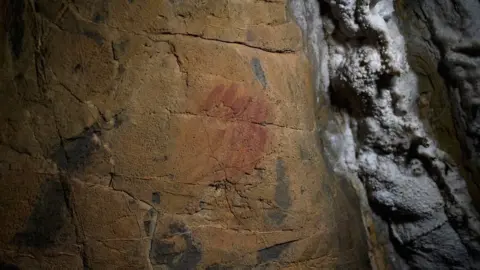Neanderthal markings in Spain suggest cave art, study says
 Getty Images
Getty ImagesRed markings on a stalagmite dome in a cave system in southern Spain were created by Neanderthals more than 60,000 years ago, a new study says.
The staining was applied by a process of splattering and blowing about 20,000 years before modern humans arrived in Europe, the research suggests.
An earlier study attributing the markings to the extinct cousins of modern humans was questioned.
Some experts argued the staining in the Cueva de Ardales occurred naturally.
But a new study published in the journal PNAS supports the view that the red ochre pigments discovered in three caves in the Iberian Peninsula are a form of Neanderthal cave art.
It states that the deposits stand out from other natural materials sampled in the caves because of their unusual colours and textures.
The new analysis, which includes more detailed dating, suggests some of the markings are about 65,000 years old.
The Palaeolithic artwork, it says, must have been made by Neanderthals, a "sister" species to Homo sapiens, as they were Europe's sole human inhabitants at the time.
 Getty Images
Getty ImagesThe research also revealed that the pigment was applied at different times, sometimes more than 10,000 years apart.
It suggests generations of Neanderthals returned to the site over time to make symbolic markings.
This study will add to mounting evidence that the intellectual capabilities of our evolutionary cousins may have been underestimated, researchers say.
The authors of the PNAS study said the markings were not "art" in the narrow sense of the word, but rather the result of "graphic behaviours" intended to create visual symbols.
The site in the Cueva de Ardales, located in a mountain range in the Spanish province of Málaga, was discovered in 1821 after a concealed entrance was exposed following an earthquake.
In 2014, experts said that an engraving found at a separate cave in Gibraltar provided compelling evidence for Neanderthal art.
The geometric pattern identified in Gibraltar, on the southern tip of Europe, was uncovered beneath undisturbed sediments that have also yielded Neanderthal tools.
